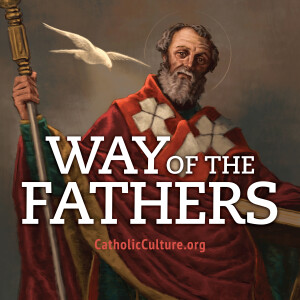
As a theological poet, he is peerless but for Dante. Yet Ephrem’s fame rests not only on his words, but also on his heroic deeds. He lived almost his entire life in a war zone. He helped invent the hospital and the women’s choir. He served tirelessly in times of famine and natural disaster—and he died caring for the sick during a pandemic. More than 500 of his hymns have survived into our time.
Links
Free audiobook readings of St. Ephrem’s hymns https://www.catholicculture.org/search/search.cfm?searchgoals=6&andsearch=Ephrem%20audiobooks
Ephraim the Syrian, The Nisibene Hymns https://www.catholicculture.org/culture/library/fathers/view.cfm?recnum=2224
Ephraim the Syrian, Nineteen Hymns on the Nativity of Christ in the Flesh https://www.catholicculture.org/culture/library/fathers/view.cfm?recnum=2225
Sozomen, Ecclesiastical History (Ephraim’s story is at Book III, Chapter XVI) https://www.catholicculture.org/culture/library/fathers/view.cfm?recnum=2885
Robert Murray, S.J., Symbols of Church and Kingdom: A Study in Early Syriac Tradition https://www.amazon.com/Symbols-Church-Kingdom-Syriac-Tradition/dp/0567030822/
More works by the Fathers https://www.catholicculture.org/culture/library/fathers/
Mike Aquilina’s website https://fathersofthechurch.com
Mike Aquilina's books https://catholicbooksdirect.com/writer/mike-aquilina/
Theme music: Gaudeamus (Introit for the Feast of All Saints), sung by Jeff Ostrowski. Courtesy of Corpus Christi Watershed http://www.ccwatershed.org
Donate today! https://www.catholicculture.org/donate/audio
More Episodes
 2024-10-23
2024-10-23
 2024-10-09
2024-10-09
 2024-09-25
2024-09-25
 2024-08-17
2024-08-17
Create your
podcast in
minutes
- Full-featured podcast site
- Unlimited storage and bandwidth
- Comprehensive podcast stats
- Distribute to Apple Podcasts, Spotify, and more
- Make money with your podcast
It is Free
- Privacy Policy
- Cookie Policy
- Terms of Use
- Consent Preferences
- Copyright © 2015-2024 Podbean.com





